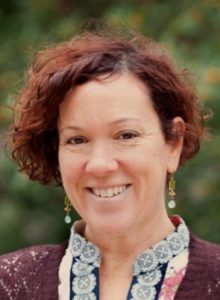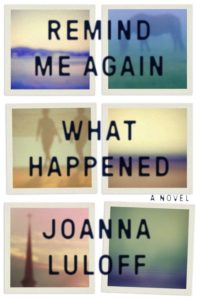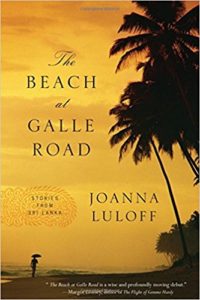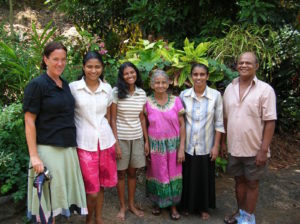Talking with Joanna Luloff about her new novel (Sri Lanka)
 Joanna Luloff received her MFA from Emerson College and her PhD from the University of Missouri. Before all of those years of graduate school, she served as a Peace Corps Volunteer in Baddegama, Sri Lanka. Her short stories have appeared in The Missouri Review, Confrontation, Western Humanities Review, Memorious, and New South, and her collection The Beach at Galle Road was released by Algonquin Books in October, 2012. Her debut novel Remind Me Again What Happened is forthcoming in June from Algonquin. She is an Assistant Professor of English at University of Colorado Denver. More information at www.joannaluloff.com.
Joanna Luloff received her MFA from Emerson College and her PhD from the University of Missouri. Before all of those years of graduate school, she served as a Peace Corps Volunteer in Baddegama, Sri Lanka. Her short stories have appeared in The Missouri Review, Confrontation, Western Humanities Review, Memorious, and New South, and her collection The Beach at Galle Road was released by Algonquin Books in October, 2012. Her debut novel Remind Me Again What Happened is forthcoming in June from Algonquin. She is an Assistant Professor of English at University of Colorado Denver. More information at www.joannaluloff.com.
Joanna, where were you before the Peace Corps?
Well, I was born in Belgium, but my family moved to Massachusetts when I was quite young. I grew up in Southboro, a small town near Worcester. I went to Algonquin Regional High School, then on to Vassar College for my BA, Emerson College for my MFA, and University of Missouri for my PhD.
Why the Peace Corps?
There were a lot of reasons. During my junior year in college, I had been planning to travel abroad, but my mother became quite ill, and I knew I needed to stay closer to home. The desire to travel and to engage the world from a different vantage point had always appealed to me, so I kept those goals close even as I had to delay them. At the same time, I started to volunteer as a literacy tutor at an upstate New York prison. The pairing of teaching and volunteer work became increasingly important to me, and Peace Corps seemed like the right fit for this kind of work.
When did you serve in Sri Lanka?
I served in Sri Lanka from 1996-1998 as a TESL teacher, though I also worked with women on small business development projects.
And after the Peace Corps?
First I traveled with my fellow PCV friend Colleen. We journeyed through India and then on to England and when we returned to the States, we took a long road trip from the northeast out to California and back. Then I worked at a bookstore before applying to graduate programs in creative writing. Since then, I have been teaching creative writing and literature at the college level.
You’re teaching now, right?
Yes, I teach creative writing workshops (fiction and creative nonfiction), narrative theory, and literature courses at University of Colorado Denver.
As I understand, Remind Me Again What Happened is your debut novel and will be published in June. Tell us about that book.
 My mother lived with lupus, a seizure disorder, and memory loss for the last twenty years of her life. Her seizures created what she called her “black hole,” years from her past where her memories were foggy or nonexistent. She used to tell me how strange it was to have to borrow other people’s memories. During my PhD, I asked her to collaborate with me on a multi-media project where she would select a photograph from her parents’ old albums—photographs from her own childhood—and record herself telling the stories she saw in them. Her memories were sharpest, it always seemed to me, from her more distant past. She claimed ownership over these narratives much more confidently than when we talked about more recent events. Of course, I could never know for certain if what she was narrating was “true” or not. In the end, I put together a far too-artsy and self-indulgent film that layered my mother’s voice over the photographs and then inserted fictional narratives on top of these threads. Though the project (thankfully) never saw the light of day, I got to thinking about the subjective truth of our shared histories, how we know ourselves through the lenses and memories of others, and how disorienting it can feel when a person we rely on to hold and share our pasts can no longer do so.
My mother lived with lupus, a seizure disorder, and memory loss for the last twenty years of her life. Her seizures created what she called her “black hole,” years from her past where her memories were foggy or nonexistent. She used to tell me how strange it was to have to borrow other people’s memories. During my PhD, I asked her to collaborate with me on a multi-media project where she would select a photograph from her parents’ old albums—photographs from her own childhood—and record herself telling the stories she saw in them. Her memories were sharpest, it always seemed to me, from her more distant past. She claimed ownership over these narratives much more confidently than when we talked about more recent events. Of course, I could never know for certain if what she was narrating was “true” or not. In the end, I put together a far too-artsy and self-indulgent film that layered my mother’s voice over the photographs and then inserted fictional narratives on top of these threads. Though the project (thankfully) never saw the light of day, I got to thinking about the subjective truth of our shared histories, how we know ourselves through the lenses and memories of others, and how disorienting it can feel when a person we rely on to hold and share our pasts can no longer do so.
My novel attempts to explore some of the questions and conflicts my mother’s experience brought up for me, for her, and for our family and friends, though, of course, transposed onto the lives of very fictional characters. Claire, the character in my novel with memory loss, uses photographs to investigate the past and present of her own life. Without her own memories, she both relies on others and distrusts them to provide ways of relearning herself. Charlie, her estranged husband, and Rachel, her best friend, want and need Claire to remember their shared history, because without her confirmation of their memories, their love and anger and resentments no longer feel quite so real or trustworthy. So they all take turns narrating their version of the past, grappling for authority and a claim on the truth, all the while trying to define the love and anger they carry for each other.
The novel book has a series of black-and-white photos which is unusual. Where the photos your idea or added by the publisher?
The photos were my idea. From both personal experience and a lot of reading around photography studies, I’ve been interested in the relationship between photographs and memory, how we often look to photographs to corroborate or honor or memorialize the past. Claire, the character with memory loss in the novel, uses photographs to help her understand and see the past that she no longer remembers. She also takes pictures of the present to keep a record of her experiences, which often feel so fleeting in her mind. It made sense to me to layer actual photographs into her chapters to suggest how she is using evidence from her own life to lead her back toward knowing herself. The photos are from my own family’s albums, from thrift stores, and from more recent photographs I’ve taken.
Your first book is entitled, The Beach of Galle Roadis. It is a collection of short stories that, I understand, grew out of your experience of being a PCV in Sri Lanka. Tell us about those stories.
 It’s true that the stories grew out of my experience of being a PCV in Sri Lanka (and also grew away from my experience there). During my time in Sri Lanka, everyone I met had been touched by the civil war in some way. The boys I taught participated in military drills before and after school several days a week. People had lost family members, had been displaced, or, at the very least, felt the economic burdens of living in a nation at war. As an American volunteering in Sri Lanka – as a seemingly neutral outsider—many people shared their experiences with me, and I found that I was collecting stories without even realizing it. In my journals. In my letters home. In my memory. We were the last batch of volunteers allowed to carry out our service in Sri Lanka. The civil war, as far as Washington was concerned, had become too uncontained and dangerous, and so Peace Corps pulled out of the country. When I returned to the States, I read about the war in Sri Lanka in the New York Times and the Washington Post, and while I recognized the facts of these articles, I felt as though the coverage of the war was often superficial or cursory and that the stories I had heard and the tensions I had witnessed were absent from the stories of Sri Lanka that Americans were consuming through our media. The stories in my collection were, in a way, my attempt to translate my experiences and observations as well as the stories generously shared with me by Sri Lankan friends and colleagues and strangers into fiction. The narratives shift perspectives between American volunteers, Sinhalese families, and Tamil families, and my hope is that they address the layers and complexities of the civil war through the lens of individual experiences — of families and friendships, of love and loss and change.
It’s true that the stories grew out of my experience of being a PCV in Sri Lanka (and also grew away from my experience there). During my time in Sri Lanka, everyone I met had been touched by the civil war in some way. The boys I taught participated in military drills before and after school several days a week. People had lost family members, had been displaced, or, at the very least, felt the economic burdens of living in a nation at war. As an American volunteering in Sri Lanka – as a seemingly neutral outsider—many people shared their experiences with me, and I found that I was collecting stories without even realizing it. In my journals. In my letters home. In my memory. We were the last batch of volunteers allowed to carry out our service in Sri Lanka. The civil war, as far as Washington was concerned, had become too uncontained and dangerous, and so Peace Corps pulled out of the country. When I returned to the States, I read about the war in Sri Lanka in the New York Times and the Washington Post, and while I recognized the facts of these articles, I felt as though the coverage of the war was often superficial or cursory and that the stories I had heard and the tensions I had witnessed were absent from the stories of Sri Lanka that Americans were consuming through our media. The stories in my collection were, in a way, my attempt to translate my experiences and observations as well as the stories generously shared with me by Sri Lankan friends and colleagues and strangers into fiction. The narratives shift perspectives between American volunteers, Sinhalese families, and Tamil families, and my hope is that they address the layers and complexities of the civil war through the lens of individual experiences — of families and friendships, of love and loss and change.
As you are well aware, Joanna, we have a lot of “Peace Corps writers” and “would-be authors.” How did you go about getting your book published with Algonquin, a first class publishing company.
I wrote and revised the stories in my collection over many years, starting in my MFA program at Emerson College in Boston. At that time, I was also working at Harvard Book Store. One of my friends at the store went on to become an editor and then a literary agent. Christopher had seen some of my stories when we worked together, and many years later, he reached out to ask if I had a manuscript I might share with him. He was just starting out as an agent, and I finally felt like my collection was finished, so we decided to try out a partnership. After several “no’s” from both larger and smaller publishing houses, Christopher met Chuck Adams (I believe at the Frankfurt Book Festival, but I might be getting that detail wrong!), who agreed to look at my manuscript. And, very fortunately for me, Chuck decided to take me on as one of his authors.
Have you read many RPCV writers?
I’ve read many RPCV writers. I gravitate toward fiction, and before my service in Sri Lanka, I had read Bob Shacochis and Paul Theroux’s work. Since I’ve returned, I’ve been lucky to know (in person and through their writing) Susi Wyss, Mark Brazaitis, Tyler McMahon, and Peter Chilson, and I’ve learned from and enjoyed their stories and novels and travel writing very much.
Remind Me Again What Happened is being published on June 26th. Your publisher has scheduled a 7-city tour. Where will you be appearing so we can alert RPCVs in those cities?
Algonquin continues to add events to my author’s tour, but these are my reading dates and venues so far!
Tuesday, June 26
7 p.m. Tattered Cover Book Store
Address: 2526 E. Colfax Avenue, Denver, CO 80206
Monday, July 16
7 p.m. Harvard Book Store
Address: 1256 Mass Ave, Cambridge, MA 02138
Wednesday, July 18
7 p.m. RJ Julia Booksellers
Address: 768 Boston Post Road, Madison, CT 06443
Thursday, July 19
Bank Square Books
Mystic, CT
Wednesday, July 25
7:30 p.m. Boulder Book Store
Address: 1107 Pearl St, Boulder, CO 80302
Wednesday, August 1
7 p.m. Elliott Bay Book Company
Address: 1521 Tenth Avenue, Seattle, WA 98122
Thursday, August 2
7 p.m. Annie Bloom’s
Address: 7834 SW Capitol Hwy, Portland, OR 97219
Joanna, those are great book store and good luck to you and keep writing. It is a great book.
Thank you, John. I’ll let you know of any additional readings.

Congratulations, Joanna. The Beach sounds like a fascinating novel. Best wishes in your book tour.
Thank you, David!
Hello Joanna ,
The Beach sounds is a very interesting novel about your stay in our country .I am very happy to work with you and learn from you.I am planning to start a project help the students in Baddegama and suburbs to improve their standard of English .I need your kind help .Please support me.
Sepala jayasinghe
Sepalaj @gmail.com
+94776880940